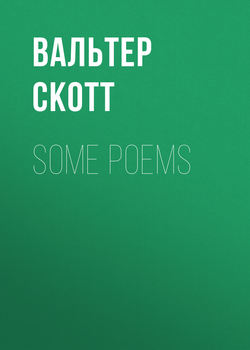Читать книгу Some Poems - Вальтер Скотт - Страница 3
THE VISION OF DON RODERICK
INTRODUCTION
ОглавлениеI
Lives there a strain, whose sounds of mounting fire
May rise distinguished o’er the din of war;
Or died it with yon Master of the Lyre
Who sung beleaguered Ilion’s evil star?
Such, WELLINGTON, might reach thee from afar,
Wafting its descant wide o’er Ocean’s range;
Nor shouts, nor clashing arms, its mood could mar,
All, as it swelled ’twixt each loud trumpet-change,
That clangs to Britain victory, to Portugal revenge!
II
Yes! such a strain, with all o’er-pouring measure,
Might melodise with each tumultuous sound
Each voice of fear or triumph, woe or pleasure,
That rings Mondego’s ravaged shores around;
The thundering cry of hosts with conquest crowned,
The female shriek, the ruined peasant’s moan,
The shout of captives from their chains unbound,
The foiled oppressor’s deep and sullen groan,
A Nation’s choral hymn, for tyranny o’erthrown.
III
But we, weak minstrels of a laggard day
Skilled but to imitate an elder page,
Timid and raptureless, can we repay
The debt thou claim’st in this exhausted age?
Thou givest our lyres a theme, that might engage
Those that could send thy name o’er sea and land,
While sea and land shall last; for Homer’s rage
A theme; a theme for Milton’s mighty hand -
How much unmeet for us, a faint degenerate band!
IV
Ye mountains stern! within whose rugged breast
The friends of Scottish freedom found repose;
Ye torrents! whose hoarse sounds have soothed their rest,
Returning from the field of vanquished foes;
Say, have ye lost each wild majestic close
That erst the choir of Bards or Druids flung,
What time their hymn of victory arose,
And Cattraeth’s glens with voice of triumph rung,
And mystic Merlin harped, and grey-haired Llywarch sung?
V
Oh! if your wilds such minstrelsy retain,
As sure your changeful gales seem oft to say,
When sweeping wild and sinking soft again,
Like trumpet-jubilee, or harp’s wild sway;
If ye can echo such triumphant lay,
Then lend the note to him has loved you long!
Who pious gathered each tradition grey
That floats your solitary wastes along,
And with affection vain gave them new voice in song.
VI
For not till now, how oft soe’er the task
Of truant verse hath lightened graver care,
From Muse or Sylvan was he wont to ask,
In phrase poetic, inspiration fair;
Careless he gave his numbers to the air,
They came unsought for, if applauses came:
Nor for himself prefers he now the prayer;
Let but his verse befit a hero’s fame,
Immortal be the verse! – forgot the poet’s name!
VII
Hark, from yon misty cairn their answer tost:
“Minstrel! the fame of whose romantic lyre,
Capricious-swelling now, may soon be lost,
Like the light flickering of a cottage fire;
If to such task presumptuous thou aspire,
Seek not from us the meed to warrior due:
Age after age has gathered son to sire
Since our grey cliffs the din of conflict knew,
Or, pealing through our vales, victorious bugles blew.
VIII
“Decayed our old traditionary lore,
Save where the lingering fays renew their ring,
By milkmaid seen beneath the hawthorn hoar,
Or round the marge of Minchmore’s haunted spring;
Save where their legends grey-haired shepherds sing,
That now scarce win a listening ear but thine,
Of feuds obscure, and Border ravaging,
And rugged deeds recount in rugged line,
Of moonlight foray made on Teviot, Tweed, or Tyne.
IX
“No! search romantic lands, where the near Sun
Gives with unstinted boon ethereal flame,
Where the rude villager, his labour done,
In verse spontaneous chants some favoured name,
Whether Olalia’s charms his tribute claim,
Her eye of diamond, and her locks of jet;
Or whether, kindling at the deeds of Græme,
He sing, to wild Morisco measure set,
Old Albin’s red claymore, green Erin’s bayonet!
X
“Explore those regions, where the flinty crest
Of wild Nevada ever gleams with snows,
Where in the proud Alhambra’s ruined breast
Barbaric monuments of pomp repose;
Or where the banners of more ruthless foes
Than the fierce Moor, float o’er Toledo’s fane,
From whose tall towers even now the patriot throws
An anxious glance, to spy upon the plain
The blended ranks of England, Portugal, and Spain.
XI
“There, of Numantian fire a swarthy spark
Still lightens in the sunburnt native’s eye;
The stately port, slow step, and visage dark,
Still mark enduring pride and constancy.
And, if the glow of feudal chivalry
Beam not, as once, thy nobles’ dearest pride,
Iberia! oft thy crestless peasantry
Have seen the plumed Hidalgo quit their side,
Have seen, yet dauntless stood – ’gainst fortune fought and died.
XII
“And cherished still by that unchanging race,
Are themes for minstrelsy more high than thine;
Of strange tradition many a mystic trace,
Legend and vision, prophecy and sign;
Where wonders wild of Arabesque combine
With Gothic imagery of darker shade,
Forming a model meet for minstrel line.
Go, seek such theme!” – the Mountain Spirit said.
With filial awe I heard – I heard, and I obeyed.
